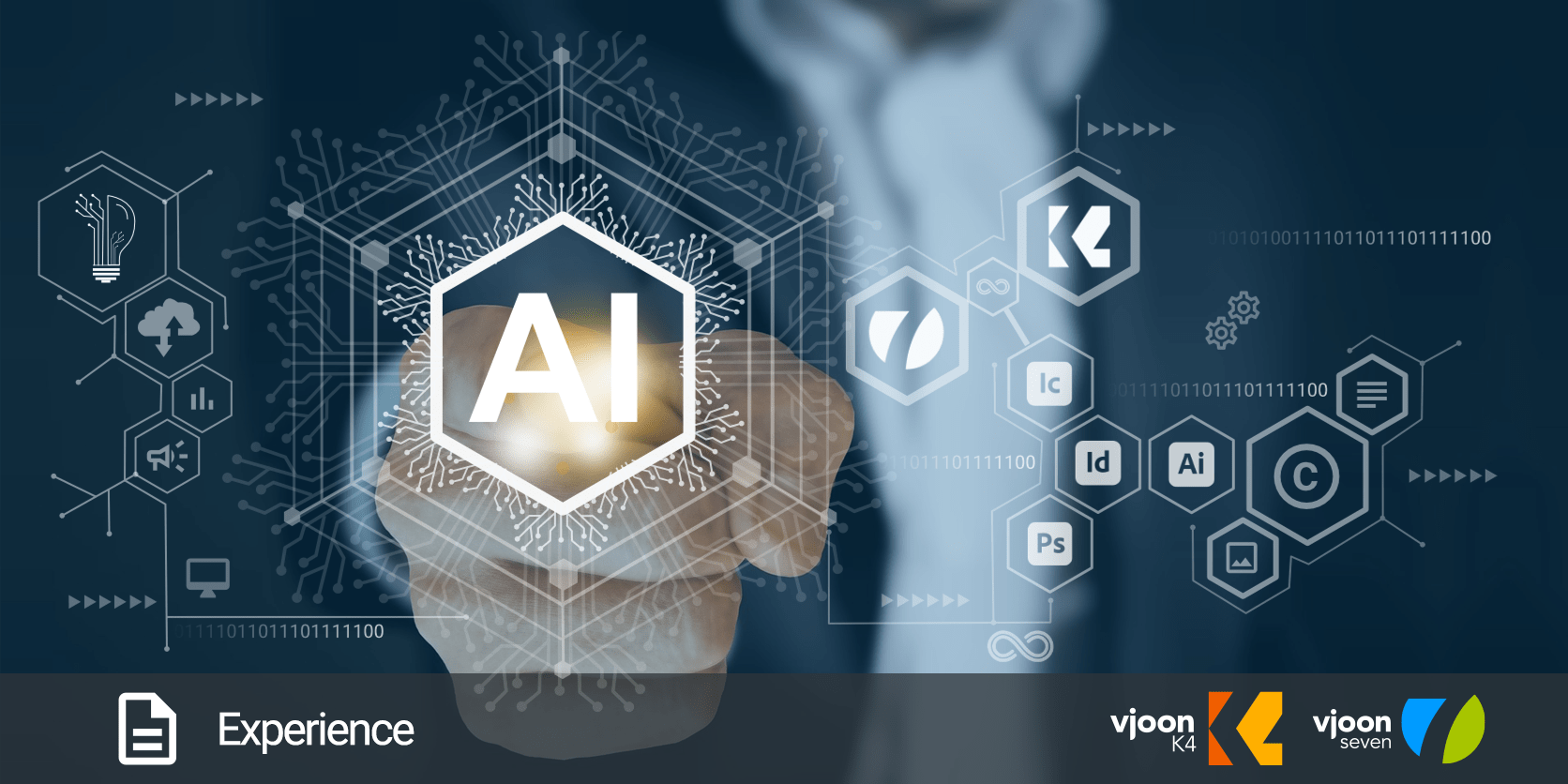
AI content for vjoon K4 and vjoon seven
Which opportunities and risks arise from AI?
In 2008, the world's leading audio streaming service Spotify took a full 5 months to reach 1 million users. Fourteen years later, ChatGPT reached the million mark after just 5 days and, accompanied by enormous media coverage, triggered a huge hype around the topic of artificial intelligence (AI). Of course, AI was nothing really new in 2022, but overnight it made its way into everyday life. Suddenly, everything was conceivable. Even in year one of its existence, ChatGPT passed bar exams in the U.S. better than 90% of examinees, could create websites based on a mere drawing, check programmed code for errors, and make dinner suggestions after looking in the fridge. This bot alone is smarter and more versatile than any computer program before it.
While some people think they are already on their way to paradise with AI applications, others also see the critical aspects. For example, there is the effect of so-called hallucination: in this case, an AI derives data that is freely arranged from what has been learned during training and thus occasionally quotes studies and statements that are far from any fact. So to speak, "fake news." There is also always a copyright issue when using AI. Not only with regard to the training data itself, but also with regard to the results obtained – one is not always the sole owner of the rights. Often, one grants the developer of the AI tool used rights to the results obtained, or the use is not free of charge. AI is also a term that is currently being written on many labels, although on closer look it is sometimes more a matter of automation. How much intelligence is actually in AI today, when AI is really just evaluating existing data and recombining it? Is the creativity of an AI equal to that of a human being and will AI in the future also be able to create something entirely new with the intrinsic motivation of a human being, which means of its own will?
In any case, ethically and morally significant questions arise: Is it in our best interest at all for large tech corporations to decide which training data is used? Which and how many jobs might be lost through the use of AI tools? What risks to our own existence are we taking with ever more sophisticated AIs? Some answers we will only get over time. What is somewhat realistic, however, is that we will encounter AI and AI applications more and more frequently in our everyday lives.
But what use cases are there in content management at all?
In addition to the fact that the amount of content produced will grow even faster than it already has, we are currently observing various areas of application in terms of AI, especially with regard to texts and images. The high costs of producing or licensing images in particular can be reduced through the use of AI. Here, for example, our long-standing partner Adobe is already very far along. Generative AI features from Adobe Firefly have already been integrated into Creative Cloud applications. This is twice as good for vjoon customers. For example, if motifs in a layout need to be changed at short notice, or if different color variants of a product image are required, this can be done directly with Adobe's creative tools, and the results are managed as before in the vjoon K4 publishing system or the vjoon seven digital asset management system. The same also applies, of course, to images created with Midjourney, Dall-E or similar AI tools. All in all, everything remains as simple as ever for vjoon customers, but enhanced with the fascinating possibilities of generative AI.
We also see a number of possibilities for texts. Mostly, there is a desire to summarize, shorten or lengthen texts with the help of AI. Summarizing often arises with digital-first, when longer texts are to be adapted for print layouts on the basis of predefined character sets, but also generally for social posts and headline proposals. However, many of our customers are still very critical of the pure creation of a entirely new text on a specific topic due to the aforementioned reservations, but the appropriate AI tools can certainly be used for initial research. Search engine optimization (SEO) for online texts is also a topic, because AI tools are excellently suited for tasks such as keyword research, distribution and performance optimization.
Freedom of choice. Anything is possible.
There are already many excellent tools for AI-generated text and images. The big tech companies like Adobe, Microsoft and Google are investing tons of money in this area and are now integrating their tools directly into applications like Photoshop, Illustrator and Office or into browsers like Chrome and Edge. In addition, there are already plug-ins for Adobe InDesign and InCopy that work with established AI tools like ChatGPT and Dall-E from OpenAI. Sensibly combined, AI tools even facilitate the creation of entire print magazines - something some of our customers are already testing extensively.
However, the more extensively AI is used, the more important it is to have it checked by humans - basically everyone agrees on that. The final decision on how much AI to use is a business one, but purely technical development is still in its infancy. The good thing is that it remains very convenient for vjoon customers, because they can work with AI tools of their choice and effortlessly use the results in K4 and seven.

